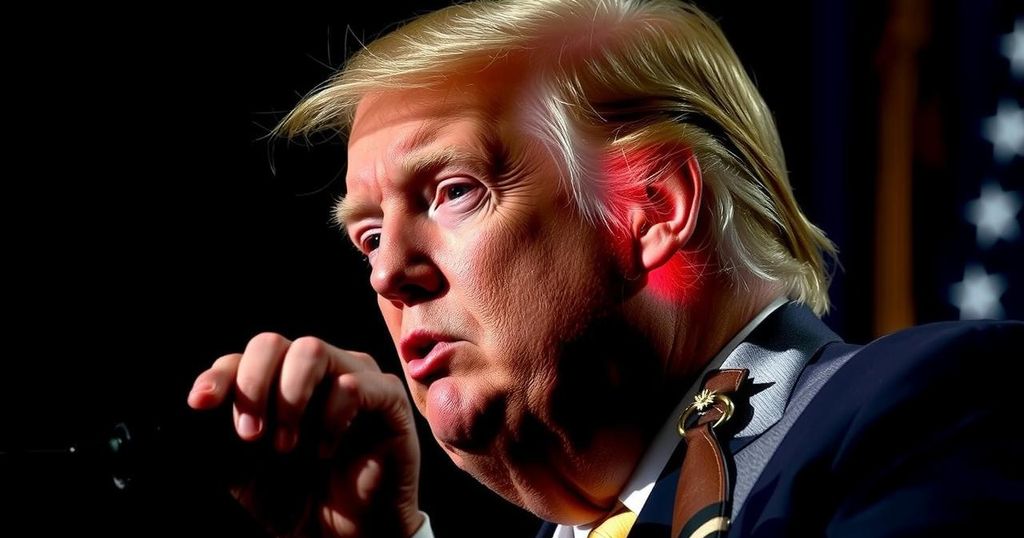Former President Donald Trump has labeled the U.S. a “third world nation” due to alleged election fraud, reiterating claims of widespread “skullduggery” in the 2020 election. He vowed to scrutinize the 2024 electoral process closely and promised to prosecute anyone found cheating. His recent criticisms target Virginia’s voter roll purging initiative, while experts highlight the lack of reliable evidence for claims of noncitizen voting. Early voting trends show varying participation rates between Democrats and Republicans ahead of the November election.
Former President Donald Trump has labeled the United States as a “third world nation,” voicing his discontent regarding alleged election “skullduggery” associated with the upcoming 2024 Presidential Election. In a statement posted on Truth Social, he stated, “I, together with many Attorneys and Legal Scholars, am watching the Sanctity of the 2024 Presidential Election very closely because I know, better than most, the rampant Cheating and Skullduggery that has taken place by the Democrats in the 2020 Presidential Election. It was a Disgrace to our Nation!” Trump’s assertion lacks supporting evidence, as investigations have found no substantial proof of election interference by the Democrats in 2020, despite his persistent claims of an orchestrated theft of the election. In the wake of ongoing legal proceedings involving allegations of election interference against him, Trump reiterated his conviction regarding voter fraud, promising vigilant scrutiny of the electoral process in 2024. He threatened that, should he prevail, those found culpable of cheating would face severe legal consequences. “WHEN I WIN, those people that CHEATED will be prosecuted to the fullest extent of the Law,” he proclaimed. He then extended his warning to include various individuals associated with the election, emphasizing that unscrupulous behavior would not go unpunished. In a subsequent post, Trump criticized U.S. District Judge Patricia Tolliver Giles for halting Virginia’s initiative to purge its voter rolls of potential noncitizens, indicating that her ruling was unacceptable. He accused the Biden administration of weaponizing the Justice Department and reflected on his viewpoints regarding voting rights for noncitizens, reinforcing his opinion that only U.S. citizens should have the right to vote. Notably, experts have pointed out that the individuals removed from the voter rolls were based on unreliable data and that Giles deemed the removal process a violation of federal law. The ensuing litigation from the Department of Justice underscores the complexities surrounding voter registration and the legal implications of such purges. Examining early voting trends reveals a comparative advantage for Democrats, although recent data from swing states such as Nevada and Arizona shows increased early Republican turnout. These dynamics illuminate the evolving nature of voter participation as the election approaches, although how these trends will translate into overall electoral outcomes remains uncertain.
The discourse surrounding the integrity of the electoral process in the United States has intensified, especially in light of the 2020 Presidential Election and the forthcoming 2024 election. Former President Donald Trump has been a vocal critic of the electoral process, frequently asserting claims of widespread voter fraud without substantial evidence to support his allegations. His most recent comments reflect an ongoing narrative that frames electoral administration as corrupt and subject to manipulation by Democratic officials. The legal battles surrounding election laws and voter eligibility underscore the contentious landscape of U.S. politics as various stakeholders navigate issues of transparency, accountability, and electoral fidelity.
In summary, Donald Trump’s recent comments label the U.S. as a “third world nation” regarding election integrity, emphasizing his belief in rampant fraud and threats of legal action against purported violators. His assertions come amid ongoing controversies related to voter purging in Virginia and reflect broader tensions surrounding the electoral process. While early voting trends suggest contrasting patterns of participation between Democrats and Republicans, the overall implications for upcoming elections remain to be seen.
Original Source: www.newsweek.com







